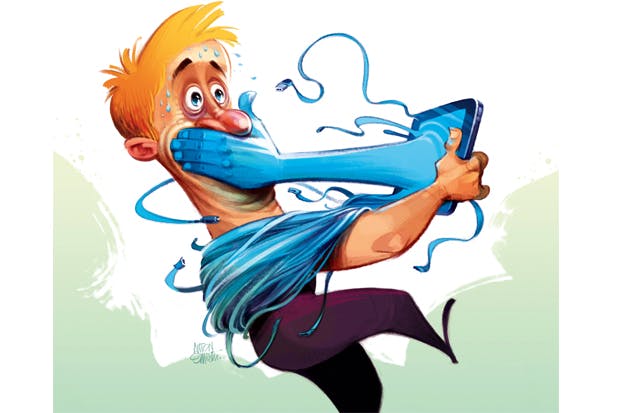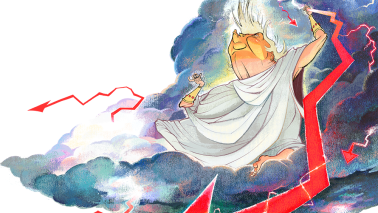When the Soviet system fell in my native Estonia I was 17 years old. I’d spent the entirety of those years mastering the main rule for surviving the USSR: you needed two separate identities. One was for home and those you trusted, the other for public places: we knew that in front of outsiders or certain relatives, you simply didn’t speak about some topics. If you followed the rules and kept the two identities apart, you could survive and even prosper. But if you mixed the two worlds up, woe betide you.
My grandparents – who’d separated in the early 1950s – led lives that illustrated this. My grandfather had joined the party and never said a word against the regime. For this he was allowed to have a new flat, a summer house and a car – a Moskvitch! My grandmother, meanwhile, never hid what she thought of the Soviet occupation, and her life was correspondingly harder. She knitted at night to make ends meet and grew vegetables in her backyard.
Superficially the USSR was supposed to be Paradise on Earth. Free education, free healthcare, a guaranteed job and housing. But what could you do with that education? You couldn’t scheme under communism – it goes without saying – to become a world famous rockstar or a multimillionaire entrepreneur. You couldn’t even dream of going travelling or visiting the countries whose languages you learned. As for that guaranteed job, it was often nominal, to save you from state-prosecution as a ‘parasite’, and the same applied to accommodation. Everything needed to be checked and ‘permitted, and whoever you were, you were expected to show up to May Day parades, wave the red flag and speak never less than glowingly of the Party.
Britain has started to remind me of the system I thought I’d left behind forever
Of course we knew about the Free World – a colourful place full of hope, we believed, and we longed to join it. We watched overseas TV channels if we could tune into them and listened – if we could avoid the frequency-jamming – to channels like the BBC World Service: a message from that Free World we longed for. By the time the Soviet Union fell in 1991, we were ready for every kind of freedom: to think, speak, gather, travel, freedom to succeed and, sure, the freedom fail too. All the freedoms, here we come!
I came to UK in 2011 after a decade in Asia, fully confident I was entering another free society. I could, within reason, say whatever I wanted to whomever I wanted. Holding different opinions, post-Soviet, from someone else hadn’t been a problem: we’d argue and end with compromise or simply agree to disagree.
Yet increasingly, Britain has started to remind me of the system I thought I’d left behind forever. Of course, it isn’t called communism this time, but various names like ‘Diversity’, ‘Equality’, ‘Inclusion’, ‘Multiculturalism’. Just like communism, it takes the ideals of the brotherhood of man but then adds on others from western individualist tradition – LGBTQ rights, open borders, MeToo (a full pantheon is getting ever more complex, potentially wrong-footing you at every turn). Like communism, it presents many ideals which, on the face of it, are hard to disagree with: equality of the sexes and of different races, for example – and then constructs a kind of secular religion out of them.
It’s one of the central ideas of Christianity that humans are inherently flawed and sinful – and the new religion too seems to be drawing on this. Anyone failing to abide by this religion’s tenets must repent at once – or rather, in Newspeak, ‘Educate Yourself’ and ‘Do Better’. This doesn’t involve the physical re-education camps of the USSR (not yet), but compulsory (re)training sessions in anti-racism, anti-sexism and anti-ableism already abound.
If you’re ostracised, you have two choices, as you did under communism: either apologise profusely and publicly and grovel to the current orthodoxy, becoming, if not a good little member of Komsomol, then a vocal and obedient ally to BLM or LGBTQIA+ (or whatever the currently favoured minority is) – or never be seen or heard of again. As in both systems, the Evil needs to be rooted out and the witches burned. Just as saboteurs and dissenters had to be removed from Soviet society, the perceived racists, bigots, transphobes, misogynists, and toxic males etc. must vanish before the Western Paradise on Earth can be achieved. Of course, the categories are constantly ramifying as are the varieties of ideological crime. One of the main features of an institutionalised religion is that it has answers to all questions – and the ones it doesn’t have answers for, you’re not allowed to ask.
Just as in the USSR, there is the issue with language and the reality it hides. ‘Democracy’ in the USSR was often the obligation to vote for one single candidate chosen for you by the Party. ‘Rule of the Proletariat’ meant rule by a small group of high-ranking Party workers. Likewise, in the Newspeak of the West, ‘inclusivity’ means making sure anyone who disagrees is not included. ‘Diversity’ spells a deadening uniformity of thought. And ‘equality’ frequently means shamelessly privileging one group over another. As to that equality, while the old communists were obsessed with the economic kind, the new communists are fixated on culture and history. The current rewriting of Britain’s past, with many dubious claims, to give minority-cultures an equal historical standing here is merely the same old taking from the ‘rich’ and giving to the ‘poor’ – except in cultural form.
This doublespeak is developing at an alarming pace, and if you don’t self-censor, you risk punishment. In the Soviet Union this came from the Party and its adherents, but in modern Britain the sources of correction are more scattered and omnipresent – it’s a multi-headed dragon, seemingly everywhere and nowhere, making it even more scary. Your neighbour may be with you on some topics, but could have signed up to their own pet cause – Refugees Welcome, Climate Change, Trans-allies – you simply don’t know. So to avoid social cancellation it’s easier simply to avoid certain issues – especially the important ones – altogether. And, you can’t help wondering, is that neighbour a true believer, or someone simply as scared to express a wrong thought as you are? It’s all increasingly familiar.
The recent debanking of Nigel Farage was a prime example of a step into new territory. After long denials from the bank it soon became clear the reason was simply disagreement with his politics. All wrapped in the elaborate justifications of the Newspeak – ‘his views did not align with our values’ or were ‘at odds with our position as an inclusive organisation.’ It was the closest thing one had seen to the Soviet jailing of dissidents, and you couldn’t help wondering what new level of punishment, to keep the masses in line, was going to come next. ‘If this can happen to me it can happen to you,’ Farage said. And as someone brought up in the ex-Soviet system, I can tell you he’s right.
So I find myself facing a dilemma: whether to pack up all of our belongings and move, perhaps back to Eastern Europe – to the Free East, where I don’t have to sing to the red rainbow flags. Or correct my speech to avoid being detected by the KGB Trans Allies. Or get labelled a dissident Alt-Right.
Or perhaps I should simply stay in the UK after all and enjoy the feeling of being back home. Back home to keeping my mouth shut.






Comments